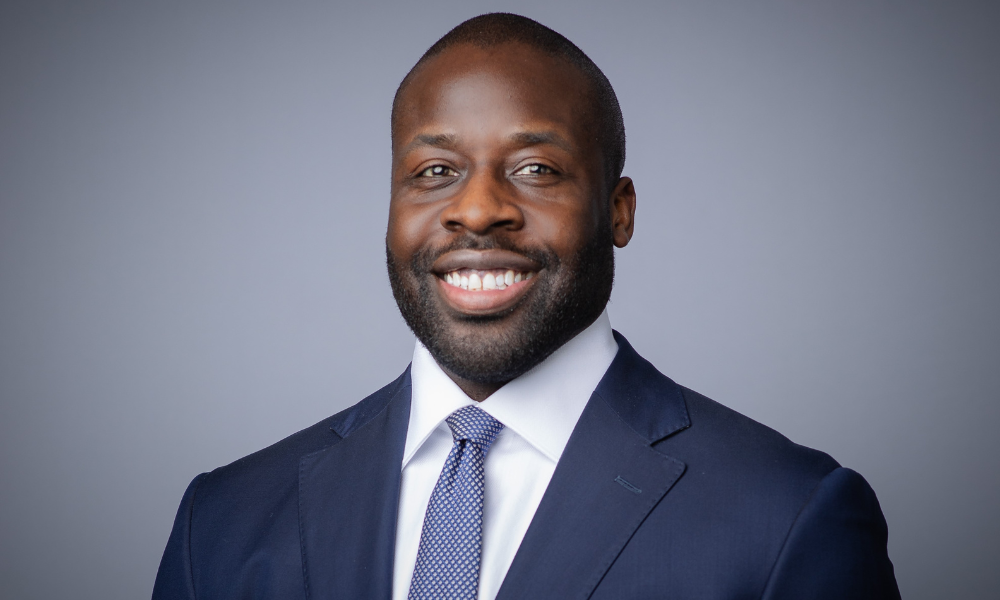
Akinremi explains what AI means for privacy law and shares tips on how to grow your practice

Olalekan (Wole) Akinremi, a new partner at WeirFoulds LLP, had a diverse legal career before joining a full-sized law firm. He articled at a boutique intellectual property firm, then moved to three in-house positions before returning to private practice, again at a boutique.
He says that his most recent transition to WeirFoulds was driven by the growing trend of clients seeking a comprehensive legal approach.
“One of the challenges that come when working at a boutique law firm is that … you can’t provide your clients with the fulsome legal experience that I think more and more companies are expecting,” Akinremi says, adding that he was drawn to the ability to provide “clients with IP advice on one side, and tax advice on another.”
Akinremi, who specializes in IP, technology and privacy law, acknowledges the advantages of boutique firms, especially for young lawyers. He says they offer opportunities to work with a variety of clients within a specialized practice area, which can help associates gain deeper expertise.
However, he says larger firms provide a broader range of resources, greater exposure to different practice areas, and a strong environment for acquiring business development skills.
Akinremi sees the opportunity to observe and learn from experienced lawyers as one of the most significant advantages of working for a larger firm.
“You can work with multiple senior partners and rainmakers. You can see how they became successful and what strategies and techniques they use to attract work and get more from existing clients,” he says.
Akinremi says that young lawyers should take advantage of every opportunity to shadow senior lawyers, attend client pitches, participate in networking events, and sit in on strategy meetings to understand how to build and sustain a strong book of business.
In addition to internal learning, maintaining professional relationships outside the firm is just as crucial, he says.
“Maintain a good relationship with everyone, and don’t get involved in any drama. Keep a good, positive working relationship with anybody you meet. You never know who can be a client,” he says, adding that staying in touch with law school classmates and professional peers is a good way to maintain a pool of potential clients or referral sources.
As a partner in WeirFoulds' technology and intellectual property group and privacy and access to information practice group, Akinremi says he mostly drafts and negotiates technology deals, including outsourcing contracts, SaaS agreements, and infrastructure-as-a-service arrangements.
He says that one of the most significant shifts in his practice has been the rise of artificial intelligence. He adds that AI changed how technology agreements are structured, introducing new clauses regarding data usage, AI training, and proprietary rights.
He says clients increasingly seek legal clarity on whether AI providers can use their data to train models and whether appropriate licensing agreements exist.
“AI is the major change that we're seeing, and we're continuing to see it evolve. AI systems have become more and more advanced,” he says. This evolution has led to new complexities in contract negotiations, but Akinremi says that AI is still in its infancy.
“I don’t see it replacing lawyers, but I definitely see AI as keeping us busy,” he says, adding that the development of the new technology raises several questions.
“What can service providers do with your data? Can they use your data to train their AI systems? How are they using their AI systems? Are they ensuring they have the right proprietary rights to use the data and the right licensing agreements for the underlying data?” All of these are questions that are becoming increasingly important, Akinremi says.
With AI becoming more pertinent to law practice, he believes young lawyers must familiarize themselves with the technology and its legal implications. Clients expect their lawyers to understand AI and use it effectively to improve efficiency, Akinremi says.
“I don’t know if it’s necessary to make law students take a course on AI, but I would definitely recommend that young lawyers get comfortable with using AI, understand it, and be aware of its risks and benefits,” he says.
“AI is not going anywhere… Just stay on top of it because your clients are going to expect you to understand it and use it to become more efficient,” Akinremi says.